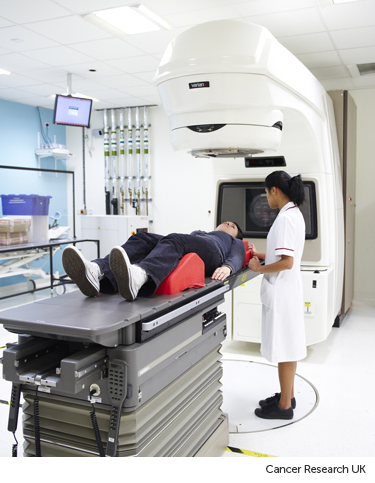Radiotherapy treatment
External radiotherapy uses high energy waves similar to x-rays to destroy cancer cells.
You have radiotherapy in a hospital radiotherapy department. You go to the radiotherapy department from your ward if you’re already in hospital.
Why do you have radiotherapy?
Radiotherapy treatment for melanoma is sometimes used to:
- shrink advanced melanoma
- help to control or relieve symptoms
Radiotherapy can cause side effects. It doesn't change the risk of the melanoma spreading to other parts of the body such as the organs.
Your doctor weighs up the benefits of giving radiotherapy against the side effects. They will discuss all the possible risks and benefits with you.
How you have radiotherapy
You have radiotherapy treatment in the hospital radiotherapy department.
For advanced melanoma you might have a single treatment or a few treatments. Radiotherapy treatment usually happens between Monday to Friday, with a rest over the weekend. The amount of treatment you have depends on:
- whether you are also having other types of cancer treatment
- the part of the body getting treated
- why you are having the radiotherapy
The radiotherapy room
Radiotherapy machines are very big and could make you feel nervous when you see them for the first time. The machine might be fixed in one position. Or it might rotate around your body to give treatment from different directions. The machine doesn't touch you at any point.
Before your first treatment, your  will explain what you will see and hear. In some departments, the treatment rooms have docks for you to plug in music players. So, you can listen to your own music while you have treatment.
will explain what you will see and hear. In some departments, the treatment rooms have docks for you to plug in music players. So, you can listen to your own music while you have treatment.

During the treatment
You need to lie very still. Your radiographers might take images (x-rays or scans) before your treatment to make sure that you're in the right position. The machine makes whirring and beeping sounds. You won’t feel anything when you have the treatment.
Your radiographers can see and hear you on a CCTV screen in the next room. They can talk to you over an intercom and might ask you to hold your breath or take shallow breaths at times. You can also talk to them through the intercom or raise your hand if you need to stop or if you're uncomfortable.
You won't be radioactive
This type of radiotherapy won't make you radioactive. It's safe to be around other people, including pregnant women and children.
Travelling to radiotherapy appointments
You might have to travel a long way each day for your radiotherapy. This depends on where your nearest cancer centre is. This can make you very tired, especially if you have side effects from the treatment.
You can ask the  for an appointment time to suit you. They will do their best, but some departments might be very busy. Some radiotherapy departments are open from 7 am till 9 pm.
for an appointment time to suit you. They will do their best, but some departments might be very busy. Some radiotherapy departments are open from 7 am till 9 pm.
Car parking can be difficult at hospitals. Ask the radiotherapy staff if you are able to get free parking or discounted parking. They may be able to give you tips on free places to park nearby.
Hospital transport may be available if you have no other way to get to the hospital. But it might not always be at convenient times. It is usually for people who struggle to use public transport or have any other illnesses or disabilities. You might need to arrange hospital transport yourself.
Some people are able to claim back a refund for healthcare travel costs. This is based on the type of appointment and whether you claim certain benefits. Ask the radiotherapy staff for more information about this and hospital transport.
Some hospitals have their own drivers and local charities might offer hospital transport. So do ask if any help is available in your area.
Side effects
The side effects of radiotherapy for melanoma vary depending on which part of your body is treated. Radiotherapy just to the skin does not have very many side effects. The skin may become slightly red and sore during the treatment period, like a mild to moderate sun burn. This begins to disappear a week or two after the treatment is over.
You might have some hair loss if you have radiotherapy to a part of the body which has hair. The hair will start to grow back some time after treatment has finished. But the regrowth may be patchy.



